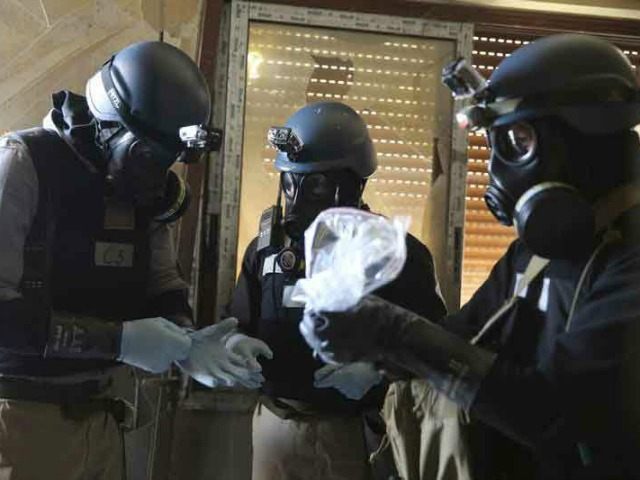A watchdog group called the Organization for the Prohibition of Chemical Weapons reports finding more evidence of chemical weapons deployment, including sarin gas, or a substance very similar to it.
The BBC says 11 chemical weapons attacks are under investigation, with at least one of them involving the presence of a sarin-like toxin in the bloodstream of victims.
The OPCW report did not state when the attacks occurred or which faction in the chaotic Syrian civil war was responsible for each. The Assad regime ostensibly promised to destroy its chemical weapons stockpiles in 2013, but the BBC notes gas attacks were launched against rebel-held villages in 2014. The Islamic State is also thought to have employed chemical weapons it captured from the Syrian military.
CNN reports that the OPCW also stated that nearly all of the chemical weapons declared by the Syrian government have been destroyed.
“This process closes an important chapter in the elimination of Syria’s chemical weapon program, as we continue efforts to clarify Syria’s declaration and address ongoing use of toxic chemicals as weapons in that country,” said OPCW director-general Ambassador Ahmet Uzumcu on Tuesday.
Assad’s patrons in Russia say there is a “very high” probability that all of the recent gas attacks are coming from ISIS.
“Several times we have noted facts of the probable use of chemical weapons by IS militants and in a broader sense by Islamic radicals, beginning with the attack in [the Syrian city] of Khan al-Assal in March 2013 against government forces,” said Foreign Ministry official Mikhail Ulyanov, as quoted by Russia’s Sputnik News.
Ulyanov speculated further that ISIS might be getting some of its chemical weapons from Turkey, an accusation Sputnik News backs up by quoting a Turkish opposition party member who claims the Erdogan government failed to investigate the shipment of chemical weapons materials to the Islamic State in Syria.
The BBC mentions the most recent alleged chemical weapons attack in Syria, killing at least five people in a suburb of Damascus on December 23. The suburb in question was held by rebel forces, and had just been hit with a barrage of rockets and barrel bombs (another indiscriminate weapon of great concern to human rights groups) by the Assad regime. According to the Lond0n-based Syrian Observatory for Human Rights, most of the surviving casualties from the rocket attack experienced breathing difficulties consistent with chemical exposure.
This attack was very similar to a chemical-weapons deployment against rebel-held areas of Damascus, Syria, in 2013, which most outside observers say could only have been the work of the regime, although the Syrian government insists rebels deployed the gas.

COMMENTS
Please let us know if you're having issues with commenting.